
Editor: Marsaleete Anderson
LINACRE COLLEGE CONTACTS

Development Office
Dr Anne Keene Director of Development
Tel +44 (0)1865 271671
anne.keene@linacre.ox.ac.uk

Marsaleete Anderson
Alumni Relations Officer

Tel +44 (0)1865 271673
marsaleete.anderson@linacre.ox.ac.uk
Ros Connell Development Officer
Tel +44 (0)1865 271658
ros.connell@linacre.ox.ac.uk
Kirsty Scott
Development Assistant

Tel +44 (0)1865 271671
kirsty.scott@linacre.ox.ac.uk
Reception
Marie Duffy
Tel +44 (0)1865 271664
marie.duffy@linacre.ox.ac.uk
Guest Room Bookings
Karen Morris guestroom@linacre.ox.ac.uk
General College Enquiries
Jackie Favarin College Secretary
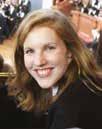
Tel +44 (0)1865 271657
Linacre College
St Cross Road Oxford OX1 3JA
Registered Charity No. 1142130
First Thoughts
As the first aconites push through the grass in the University Parks, I am looking forward to a fresh new year at Linacre. We have an exciting year ahead and I hope to catch up with many of you at reunions in Rome, California and Oxford. I love to learn what a difference Linacre folks are making across the globe. In this edition of Linacre News, you will read about Alex Littaye’s start-up business marketing pinole; Chandy Nath, physicist and professional singer; and Chris Hansen, recently elected state legislator in Colorado.
I feel that it is important to shout loudly about the remarkable impact that Oxford and our Old Members have at a time when universities are under sustained attack from the media and politicians. Some Governments in Europe and elsewhere recognise that investment in research and higher education reaps great dividends for their nation. Nevertheless, here in the UK our higher education sector is looking distinctly threadbare, lacking investment in facilities, equipment and people.
Here in Oxford we have taken a conscious decision to reverse that trend. In December, the University announced that it has raised a record amount of funding for a UK university, £750 million, through a bond issue. Over the next ten to fifteen years, Oxford expects to invest more than £1.5 billion in new projects. We intend to maintain our position as the world’s best university through investment in the most modern academic equipment, buildings and IT. We need these facilities in order to be able to do the very best research and to attract the best minds in the world. Moreover, we’re investing in our students too. We’ve created a £200 million endowment to support graduate scholarships – and we’re vigorously fundraising for more. This edition of Linacre News describes some of the many things that your college is doing to maintain Oxford as a place for our academics to think, to reason, to compare, to discriminate and to analyse. I hope that the world will be a richer place as a consequence.
Message from the Common Room
The beginning of Hilary Term is always a strange one in the academic year with a dual realisation; new students returning after the break realise how familiar Linacre feels, and that they have truly settled into Oxford life, whilst those students with graduation in sight become acutely aware that their final months in this wonderful place will soon be over. Nowhere is this more obvious than in seeing how many new initiatives there are this term, as new students get into their stride and the older ones prepare their last hurrah. In my previous message I spoke about my excitement to see how the new students enrich the CR this year. They have delivered, and how!
CR members are set to tickle their palates with both a cooking club (‘LiCC’ being their carefully chosen name) and a ‘Thrifty Wine Society’; develop their sartorial aspirations in the sewing and knitting club and through a charity formalwear sale (nowhere more useful than Oxford); and have initiated a seminar series on environmental issues. We are also looking forward to many of the things which are by now staples in the CR calendar: the Ceilidh, visits to and by our sister college, Hughes Hall, in Cambridge, and another Ball, which, after the success of last year’s, the Common Room have decided to make an annual event – lest the one-year MSc students be deprived this Oxford experience.
A particularly exciting new event is the Linacre College Women’s Dinner on 6 March, which will bring together staff, students and Fellows of Linacre to celebrate the women of the College, and in academia more broadly, in conjunction with International Women’s Day. The history of women at Oxford is a shorter one than it ought to be, but this is a wonderful student-led initiative to celebrate an important dimension of the egalitarianism so integral to Linacre’s spirit.
Sophie Debrunner Hall, Common Room President
2
Phil Sayer Contents First Thoughts 2 Advancing Linacre 3, 13 Linacre Events 4-5 ‘No End to Learning’ 6-8 College News 9 Fellows’ Focus 10 Fellows’ News 11 In Memoriam 12 The Grapevine 14-15 Sporting Linacre 16
Cover image: LBC Men’s Crew, early morning on the Isis
Photo by: Marcus Green
Advancing Linacre
The Kindness of Friends
The title of several well-known books and films, and memorably part of Blanche Dubois’s final line from Tennessee Williams’s A Streetcar Named Desire, is: The Kindness of Strangers. Although by changing one word the meaning is partially altered, that sentiment of voluntarily thinking of others, has powerful resonance in both versions. We can trace the source of much of Linacre’s recent growth to ‘The Kindness of Friends’ that is, of alumni, non-alumni, Fellows, staff, corporates, and foundations; in its pared-back simplicity, ‘kindness’, sometimes not recognised for the altruism it represents, is worth recognising. Amidst all the charitable entities we hear of on a daily basis, it can be shamefully easy to forget that every gift made philanthropically comes from a personal decision, and an act of each person’s will.
Which is why I’d like here to highlight this kindness, in tandem of course, with our individual letters of thanks. Without your willingness to make gifts, Linacre would be in a bad place today. But thanks to those sacrifices you have chosen to make (thinking of the many other ways you could have used those funds), the College has greatly expanded its student accommodation, increased the number of scholarships and JRFs, upgraded its Library and IT facilities, and has a substantially higher endowment. Thanks to you all, Linacre is in a good place today – though you won’t be surprised to hear that we will continue to encourage gifts, as our expenses, along with the desire to offer the highest level of facilities, never cease to grow.
So we don’t take this kindness for granted. We issue warm thanks to all of you, for gifts large, medium and small, for other ways in which you support Linacre, and for your friendship, which means so much. And we hope that, in turn, you feel the warmth of our gratitude.
Giacomo Vaciago Scholarship
Thanks to the generosity of Mrs Giulia Vaciago, we are delighted to announce the creation of a new College Fee scholarship named for Professor Giacomo Vaciago (1964), who died in March 2017. A leading Italian economist and academic, Giacomo was a founding member of Linacre, and, along with Professor Maurizio Lupoi (1964), a founding President and instigator of what has become a flourishing Italian Linacre Society. We were privileged to hear Giacomo’s Italian Linacre Lecture in 2003 and his lively participation in the 2015 Brexit debate in Florence; the Università Cattolica in Milan, his academic
base, was the Italian Linacre Lecture venue several times. Additionally, thanks to Giacomo’s extensive contacts in Italy, over a three-year period 2002-2005, Linacre welcomed nine Visiting Fellows from the Banca Monte dei Paschi di Siena

The new scholarship will be awarded to a student of any nationality and any academic discipline. We are honoured to have a scholarship named for Giacomo, and we warmly thank Giulia for her great kindness.
Dapo Olagunju Scholarship
We are thrilled to announce the creation of another scholarship at Linacre for a student from Africa. Thanks to the generosity of Dapo Olagunju (2005), a College Fee Scholarship has been set up, in perpetuity, for a Linacre MBA student from Africa, with a preference for Nigeria, Dapo’s home country. In the absence of a candidate from Nigeria, the scholarship will be awarded to a student from another African country. We warmly thank Dapo for his great kindness; this new scholarship is an exciting development, and will be the seventh African scholarship at Linacre.

Deepening community
It’s wonderful that the 21 residents in our new Linacre student building at 191-193 Iffley Road can now see the names of those who made purchase of this house possible, each time they enter and leave the building. The new plaque publicly thanks these generous donors, and is also a useful reminder that the building didn’t emerge from an anonymous bank account, but from individuals to whom the name of Linacre is highly valued. Two rooms and one flat have also been publicly named, with beautiful wood boards over each entrance.
We echo these public thanks, and are glad to recognise these generous supporters.
Anne Keene
3
Linacre Events
Coffee with the Principal
he the second for the usual reason, because I was older than him. We conceived the Linacre Lectures together and, would you believe this, I lectured in 2001 and he in 2002.’ Professor Pietro Corsi, Emeritus Fellow and former Professor of History of Science at Oxford, delivered an erudite and inspiring lecture on The First Oxonian Chair of Political Economy, and this was followed by vigorous questions and discussion, plus further informative background on the Chair and its history. Pietro is the first Italian Fellow to have given the lecture. Lunch at a nearby ristorante, a visit to the Museum of Contemporary Art, and dinner for those who remained, concluded the day.
Just what does an Oxford Head of House do? Linacre Members were given an opportunity to find out directly from the Principal, Dr Nick Brown, in an informal gathering over coffee and pastries, on Saturday, September 16, held in conjunction with the University’s Alumni Reunion Weekend. Clearly many College members were curious to learn more. Three Emeritus Fellows, a Supernumerary Fellow, a former JRF, and Old Members from every Linacre decade came from Turkey, Canada, Switzerland, Thailand and Australia, as well as the UK. After a frank and wide-ranging talk about the Principal’s multiple roles and responsibilities, and his concerns and goals for the future, there was a lively and informative questionand-answer period. The exchange was enjoyed on all sides, with interest in the future of Linacre at the heart of it.
18th Annual alumni event
September 2017 saw Old Members eagerly anticipating the annual Italian Linacre Lecture, with all the add-ons they have come to expect – welcoming venue, stimulating lecture by a Linacre member, interactive discussion, the Principal attending, chance to see friends and make new acquaintances, and that all-essential factor of good food. The 18th annual lecture faithfully followed this pattern. Thanks to Professor Lorenzo Infantino (1983), Italian Linacre Society President, our venue was an impressive building of LUISS, Rome. We were welcomed by Lorenzo and by Dr Arpita Pandya d’Amico (1994) Vice-President, who chaired the ILS AGM. Professor Maurizio Lupoi (1964) and Dr Anna Guagnini (1989) spoke movingly and warmly of Professor Giacomo Vaciago (1964), former President of the ILS and prominent Italian economist who died in 2017, and who is greatly missed. Maurizio and Giacomo were fellow bridge players at Linacre, and just two days apart in age; in any disagreement, Giacomo would deliver the delightful putdown line: ‘I defer to you not because you convinced me but because you are older than me.’ Maurizio continued: ‘I was the ILS’s first president and
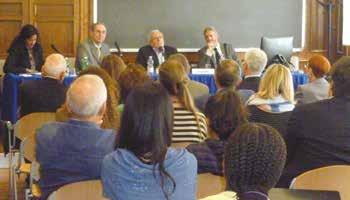
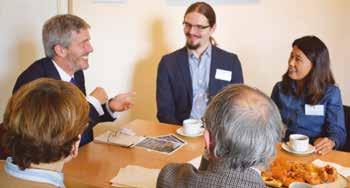
One striking characteristic of this year’s event was the presence of Old Members from outside Italy, who had travelled to Rome specifically for the event. Their participation, and travel, was greatly appreciated, making the event even more heterogeneous than usual. It therefore makes perfect sense to remind you that all Linacre members will be warmly welcomed at the 19th Italian Linacre Lecture in Modena on Saturday, September 22. Anne Keene
Scholarship holders’ lunch
As our growing number of scholarship holders at Linacre –now nearly 40 – cannot all fit into the Small Dining Room, the lunch on 17 November was for ‘newcomers’ only. It was an enjoyable opportunity to welcome the scholars and tell them about the many generous donors who have made these vital scholarships possible.

4
Informal photos are often taken at Linacre events, and may be used in College publications or on the website. Please let us know if you do not want to be photographed.
Linacre Events
‘Local’ Linacre
We’re excited about the alumni-led Linacre gatherings which have been happening around the world. Contact the College Development Office if you’d like to meet up with Linacre members in your area. You choose a date and location; we are then happy to send the invitation, with your preferred contact details, to Linacre alums in your locality. Recent events below may inspire you!
Linacre in Canberra
The first gathering since the 1990s of former Linacre members from the Canberra region was held on 11 November 2017. Former members gathered at the home of Rosemary Laing (1979) for afternoon tea in the garden. Thunder rumbled and light rain fell but the heavens cleared in time for the allimportant photographs. River corridor wildlife had been promised but everyone was talking too intensely to notice any! Our common Linacre background bridged a wide range of disciplines – archaeology, forestry, English literature, philosophy, immunology and sociology. The conversation flowed vigorously across many subjects and all agreed that it had been a thoroughly enjoyable afternoon. In the end, ‘Canberra region’ was a bit of a misnomer. Scott and Sue Phillips (née Bell) (1980 and 1981) came up from Melbourne, while Mariana Sontag Gonzalez (2014) and her partner Florian Gilbert travelled from Wollongong. Will Christie (1976), Wayne Hudson (1970) and his wife, Catherine, and David Boshier (1978) had less distance to travel. (David, incidentally, has a couple of the old Linacre dining hall benches). Consensus was that it was definitely worth doing again!
Rosemary Laing
Meet-up in Alberta
(L-R) Dr Jennifer Sherry (girlfriend of Robert), Laura Keating (2011), Dr Chris Holdsworth (1988), Dr Robert Barnes (2004) and Dr Cassandra Dam (1996) met up in Calgary on Sunday, 15 October 2017 for drinks and deep-fried pickles – a local delicacy, devoured before the photo was taken. The group included newcomers, returnees, and established locals who agreed it would be great to meet up again; a possible hike was mooted. All Linacre members are welcome to join this friendly group, including those in Calgary on work or pleasure; you can make contact via the Linacre Development Office.
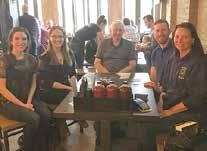
Ottawa Sunday brews
Linacre Old Members in Canada’s capital city also came together for an inaugural ‘Linacre Sunday brews’ (beer, coffee or tea) in Ottawa on 19 November. Gemma Boag (2008), Heather Semotiuk (2015), Dr Jamieson Weetman (1999) and Jessica Lax (2008) had such a good time they forgot to take a photo. A repeat gathering is on the cards for 2018, with all Linacre alumni very welcome to join them.
Hong Kong hike
Members of the Linacre Hong Kong Society and Oxford Business Alumni (OBA) held a joint hike on Saturday, 28 October. A day of glorious weather and wonderful scenery concluded with a seafood dinner. More events are planned.
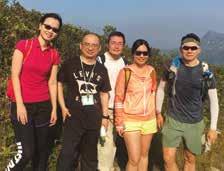
Looking ahead…
April 6-8 • Oxford University North American Reunion, San Francisco.
Linacre Dinner, Saturday April 7
April 8 • Linacre Dinner, Los Angeles
April 11 • Linacre Dinner, New York
June 30 & July 1 • Linacre Gaudy
For Founding Members, 1962 – 1971. Invitations have been sent to all Old Members for whom we have an e-mail or postal address.
September 14 • Linacre dinner and recital Alumni Reunion Weekend, Oxford

September 22 • Italian Linacre Lecture, Modena
Keep up to date Event details are published on the College website: http://www.linacre.ox.ac.uk/oldmembers-friends/old-members-friends-events, or email development@linacre.ox.ac.uk for information.
5
‘No end to Learning’*
Dr Chandrika Nath (1993) Acting Head, Parliamentary Office of Science & Technology
the frosty silence. This inspired me to form a band when I returned home, and I’m still in it fifteen years later.
After this post-doc I still didn’t have a clear idea of what I wanted to do. I’d had a great time but I’d also learned enough about myself to know I didn’t have patience for a career in research. But I’d spent a month working with The Daily Telegraph on a British Association Media Fellowship and realised I loved science communication, although I knew that the fast pace of journalism wouldn’t suit me. So when I saw an advert for a ‘scientific adviser’ at the Parliamentary Office of Science and Technology, I jumped at it.
As a child I was always told that whatever knowledge or skills I wanted to gain in life, I had until 18 to wire them into my brain. After that, my teachers warned, my grey cells would start dying off one by one. But how wrong they were! I remember little of school. The most vivid recollections I have of childhood are of nights spent looking through my telescope marvelling at the vastness of space. This early nurturing of a sense of wonder and curiosity has done more for me than any early academic training.
I always knew I wanted to learn more about fundamental physics, so I was over the moon when I got a DPhil place in High Energy Physics back in the early ‘90s. I accepted the place without a moment’s hesitation. However, it wasn’t at all what I expected. My doctorate was, as it turned out, 99% fixing bugs in software, and 1% interesting physics. Not being a natural coder, I really struggled to learn programming although I got there in the end (with a lot of moral support from Linacre!) By the time I finished, I knew that although I still loved the subject, I didn’t enjoy the day-to-day routine enough to make a career of it.
But I wasn’t quite done with research. Just after writing up I saw an advert for a ‘glaciologist’ at the British Antarctic Survey. As a child, I’d dreamed about travelling to the ends of the earth (when I wasn’t gazing into space) and this job gave me the chance to travel to the Antarctic to collect data on fast-flowing ice. I had to get to grips with a whole new research field, but that was easy – it was all so exciting. The physical challenge was far greater. I’d always focussed on academic learning, but to survive for several months in a tent in Antarctica thousands of miles from the nearest base, I had to learn a few practical skills! I also started writing music in
Members of Parliament have to make decisions about a vast array of complex topics. Researchers like me are tasked with providing them with the information they need to make those decisions informed. Should we build a new fleet of nuclear power stations? How do we prevent the next pandemic? What will Brexit mean for UK science? The list goes on. It’s a constant learning process; as soon as you become an expert in one thing, priorities change and you need to be an expert in something else. What’s most important is to be able to get to grips with new areas and pass that knowledge on to politicians in an understandable way. I never really planned to work at the interface between research and politics, but it turned out to be the perfect move for me (and parliamentary recesses coincide with the festival season, so I’ve been able to keep my band going too!)
My work here has been hugely varied. I spent my first few years assessing the risk of terrorist attack at UK nuclear reactors – not something a particle physics DPhil had prepared me for! I then went on to run a project within the Parliament of Uganda, helping their policymakers become more science-literate. This ran for four years and led my office to work with policymakers in Kenya, Malawi and now all over the world. After this I moved into a more managerial role; my job is all about how to enable other people to do the best job they can, rather than doing any real research myself. But I know I won’t do this forever and am always looking for the next challenge.
I’ve come to the conclusion that I’ll probably never be an expert on any specific issue. Nor will I settle on a specific vocation. I will probably end up having a string of different careers. This used to bother me, but now I feel OK with it. Constant learning is what keeps life exciting and acquiring new skills doesn’t have to get harder as you get older, as long as you learn by doing rather than sitting with your nose in a book. The best things in life happen when you take a step into the unknown.

6
House of Commons
*The College motto, proposed by Linacre’s first Principal, John Bamborough, is a line from Robert Browning’s poem, The Grammarian’s Funeral (1855).
‘No end to Learning’
Dr Chris Hansen (2003) Colorado State Representative

energy-related bills in 2017, including an asset securitization for the power sector proposal that received some national press attention and generated inquiries from other states about the approach. I have also brought forward legislation to address long-term power transmission planning options and integrating more grid scale storage technologies, such as lithium ion batteries, compressed air and water-system pumped hydro options. All three bills would increase opportunities for renewable energy and reduce emissions. During this new session I have been developing water conservation and demand management legislation for residential developments in Colorado.
We left the warm embrace of Oxford in 2005, after four incredible years of discovery and a couple of ‘almost finished’ DPhils. My subsequent career in energy research and analysis came with opportunities to live in Boston and Dubai with project work from Libya to New Zealand. But in the spring of 2015, with the unwavering support of my wife Ulcca (Linacre ’01), I decided to make a big change in my life. I left the corporate world and decided to run for elected office. It was a long and difficult campaign, with negative attacks from my opponents in the Democratic Party primary on myself and the family. In June of 2016, after knocking on 5000 doors and raising almost $160,000 in small donations, we learned the reaction of the voters. I secured nearly 60% of the vote that day to be elected to the Colorado House of Representatives and now have the privilege of representing the approximately 95,000 residents of east-central Denver, Colorado.
The first year of this new adventure has been filled with learning and an almost endless set of new experiences. I ran 14 pieces of legislation in the 2017 session and sit on four legislative committees: Appropriations, Capital Development, Agriculture & Natural Resources, and Transportation & Energy. The first two committees deal directly with approving the $30 billion state budget. The Capital Development Committee (CDC) is a statutory committee with three members from each chamber responsible for reviewing funding requests for capital projects and maintenance from all state agencies.
My other two assignments are the committees of reference for water, transportation, energy and natural resource issues. These are focus areas for my legislative work and most of my proposed legislation falls into these categories. I proposed three
But beyond my own excitement to be in the middle of important policy debates in energy and the environment, I think what I love most about the new job is the constant set of new puzzles. Those can take the form of complex policy issues – how to fund the roads or how to adjust the school funding formula. They can also take the shape of political challenges – which stakeholders, colleagues or interest groups need to be convinced that your bill is the right approach, or perhaps is in their best interest.
I believe my job as a legislator is to lead on key issues and to help negotiate solutions to complex problems with diverse stakeholders. Due to a shortage of institutional resources and term limits, the Colorado legislature is often following the lead of well-funded interest groups. I want to work hard during my tenure to bring stakeholders together, instead of deferring that authority to outside groups and lobbyists.
I could not do this work without the solid foundation of inquiry and skepticism that I learned at Linacre, nor would this job be tenable without all the learning I did outside of the library that taught me to listen to and absorb new ideas. I would love to welcome anyone from Linacre who is ever passing through Denver; your Capitol tour awaits.
Chris Hansen specialises in energy sector economics and data analytics, with 20 years of experience in the global energy industry. Previously, as Senior Director at IHS he led a global portfolio of energy events and products. Before joining IHS, Dr Hansen was a Research Fellow at the Oxford Institute for Energy Studies and holds a BSc in Nuclear Engineering from Kansas State University; a Graduate Diploma of Civil Engineering from the University of the Witwatersrand, South Africa; a Master of Science in Technology Policy from MIT; and a DPhil in Economic Geography from Oxford University. In 2012, he was selected as a Marshall Memorial Fellow by the German Marshall Fund and in 2017 was selected as a Public Leadership Fellow at Harvard University by the Gates Family Foundation.
7
‘No end to Learning’
Dr Alexandra Littaye (2003)

Founder of Azure Foods, a social enterprise start-up
When approached to write a piece about lifelong learning, I had to confront the reality that I am now old enough to be considered as having a life’s worth of learning, albeit a short one. Until October last year, I spent my life tucked away in academic bubbles. As an idealist, I sought to understand and shape the world by learning about ideas. I was a lecturer of philosophy in the Middle East, then came to Oxford to complete a Master’s degree and a DPhil researching food networks. My research brought me onto the slopes of an active volcano in Mexico, living with indigenous farmers. There I discovered pinole, an Aztec corn flour which I believe ought to be the next quinoa. For four years, I studied one of the most hollowed out villages by youth migration in the world. The more I observed, the angrier I became. The more I published, the more useless I felt.
My despondency culminated in my third year of research when I declared to my father that I wanted to start a company to sell pinole as a high-end product to global markets to revive the village’s local economy. My father envisioned his daughter as global trader; I imagined myself welcoming back my neighbours’ children who had headed to the US to wash dishes. Azure Foods Ltd was registered, then stayed dormant for two years as I slogged to submit my thesis.
I spent the following year stuck and scared of making the leap from academia to the unpredictable and highly risky world of entrepreneurs. Throughout my ‘adult’ life, I learned teaching, researching, and publishing, and found a mentor who taught me the ropes, and encouraged me to believe in myself and aim high. It was all about endurance: ‘It’s a marathon, not a sprint.’ Know your field, acknowledge those who dominate it, outline the theoretical frameworks that surround it, position yourself, and make a contribution (however minimal that may be). Throughout a decade, I learned to work alone, set my own deadlines, and outline a domain of knowledge. I learned how to engage people whilst teaching and I learned how to wait, wait and wait during my fieldwork. Participant observation was an exercise in adaptability, patience and to a certain extent, disguise. I enjoy reading broadly and most of all, I live for the discussions with peers. I quickly came to believe my work redundant. I also came to despise the
never-ending and competitive nature of being published. My efforts seemed to direct me towards the safety of tenureship rather than shaping the world. As you may have guessed, I’m not a very good academic.
I wish I could say that deciding to quit my part-time job at Oxford last year was an act of courage. It was one of semidesperation. What should I do with years of research? It’s been over a year since I’ve tried to build Azure, infusing it with everything I learned about the food system. I’ve moved from mistake to mistake, attempting to take everything I honed during my DPhil (patience, perseverance, adaptability) and put it to good use.
Azure is about to launch its range of products in a couple of months with the only energy bars made of pinole. Since its inception, I’ve won a couple of competitions, and raised funds through a successful Kickstarter. Thanks to my previous training as a fieldworker, I have had to be extremely adaptive, network, and work unpalatable hours whilst waiting seemingly forever for others to respond. I have followed a painful number of false leads, and have had to pivot again and again with unaccustomed dexterity. Though I am now wellversed in the art of being rejected, I have had to learn to defend my ideas with panache and convince others of the worth of my proposition. I am used to being alone, waking up in different continents and time zones, working on trains and planes, and maintaining my sanity with books and Skype calls to loved ones.
The first big shift from fieldworker to entrepreneur is realising that people are happy to share their ideas and their thoughts freely. When it comes to their livelihood, money is the only reliable mobiliser. You’re not constructing a theory, you’re building a business. You’re not defending a thesis, you’re selling a product. You don’t have informants, you have employers, customers and partners. Academics read your articles, customers buy your bars. Unlike a DPhil, if your start-up is not running by the time the money runs out, it’s the end. Too many of my colleagues have had to extend their DPhil beyond deadlines whilst funds ran out.
The greatest lesson of all during this shift in career was not just questioning reality, but reshaping it. I have developed a decade’s worth of theories about what a healthy, fair and tasty food system looks like; now I get to test these in practice. Entrepreneurs are mavericks who observe aspects of life, question them, and dedicate their lives to offering new ways of doing. Though I found patterns to success, the golden rule of entrepreneurship is to rewrite the rules by which the game is played. As with academia, I relish the luxury of continuous learning though now, my start-up will only be validated when someone is willing to pay for a product. My ideas have already been validated. Can I transfigure these into a tasty bar? The test has yet to come.
8
Diane retires!
College staff, students, Fellows and Old Members feted Diane Morgan on her retirement and celebrated her tenure of over 38 years at Linacre on December 20. Diane, who has a remarkable memory for names and faces, has long been a welcoming presence for Linacre students and Old Members, who remember her with great affection. She will be greatly missed, and we all wish her a very happy retirement.
ACU Visiting Fellow
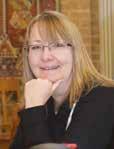
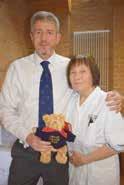
Linacre’s Association of Commonwealth Universities (ACU) Visiting Fellow for 2018, Professor Pauline Dube, delivered her ACU Lecture entitled Resilience building in the Anthropocene: The Case of Least Developed Countries, on 25 January 2018. Professor Dube, Associate Professor in the Department of Environmental Science at the University of Botswana (UB), is a global environmental change scientist with teaching and research areas extending to social and biophysical aspects of the environment including applications of Remote Sensing, land degradation/desertification, wild land fires, energy and environment, gender and environment, impacts of climate change, vulnerability and adaptation, sustainable development, and environmental hazards and disasters.

Commonwealth Scholars
Goodbye and hello
College staff gathered in the Nadel Room on December 21 to say thank you to Howard Thomas, Linacre IT Assistant, who is moving to a more senior role at the other end of South Parks Road at Keble College. Many Linacre students and staff have been rescued by Howard’s calm and cheerful IT know-how. We thank him for his good-spirited and unstinting support and wish him well in his new post.

Karen Morris was welcomed to the Linacre team on November 27 as Accommodation Manager and Assistant to the Bursar. Karen previously worked for six years at CRM Students Ltd, who manage student accommodation throughout the UK. She enjoys walking and the cinema, as well as weekends away; North Wales is a favourite destination. Karen is also a fan of ‘80s music, and is looking forward to Bath Festival in May to see Tears for Fears
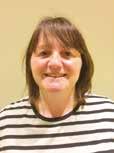
Jane Simpson is the friendly new Reception Assistant who arrived in January. She previously worked in the Finance Department at Cherwell School in Oxford and is an avid reader. Although not otherwise a cynophilist, Jane is smitten with her daughter’s 2-year-old black Labrador retriever, Freddie, whom she loves to walk.
Academic exchange
The College has signed an agreement with Ochanomizu University, Tokyo, Japan, for academic exchange, including both staff and students. The agreement was signed by the Linacre Principal and the President of Ochanomizu University, Professor Kimiko Murofushi, in Oxford, during a visit by the President and other staff. Ochanomizu University was established in 1875 as Japan’s first national higher education institution for women. Today, the University, which takes only female students, is a pioneer in promoting women’s leadership in science and the arts.

The Principal is pictured with Linacre students Allan Majalia (Kenya), Norman & Ivy Lloyd/Commonwealth Shared Scholarship holder; and Rimu Byadya (Bangladesh), Commonwealth Scholar, at a Commonwealth welcome event in London in November. Not pictured is Godfred Amankwaa, Trapnell/Commonwealth Shared Scholarship holder.
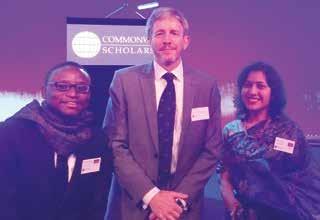
9
College News
Fellows’ Focus
Dr Jenni Ingram Associate Professor of Mathematics Education, and Linacre Fellow and Vice-Principal
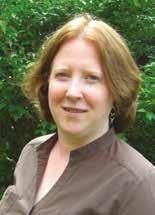
Dr Jenni Ingram ‘loved maths from a young age.’ Then she reconsidered; ‘No, I was good at it from a young age. The love came later, through teaching it.’ But if you’re good at maths, I asked, doesn’t that make you impatient with others who don’t understand as quickly as you do? ‘No, I enjoy the challenge and creativity of seeing and presenting concepts in a way in which others can understand.’ Jenni was already teaching full time when she undertook her Master’s degree, and continued to teach while working on her PhD – a normal educational pathway for teachers, but very unusual for most other academics. Although she didn’t set out to have an academic career, she enjoys her role at Oxford, but admits it is the combination of teaching and research which appeals to her. ‘If I lost the teaching, it would be a problem. Teaching is where I make the real difference, not the research.’
Jenni sees her dual roles as an education researcher and someone who educates new teachers in the profession as complementary; one informs the other. For example, she can try out ideas with her students. ‘They are very good at finding the ‘holes’ in a piece of research,’ she observes with a wry smile. In addition she undertakes small projects which are a direct result of teaching problems. But her roles do operate on different timescales. Her work with teachers requires dealing on a daily basis with issues in school which call for an immediate response, while research is much more long term.
As the media and policymakers bemoan the state of British education, and often maths education in particular, I asked Jenni for her views. While there are problems and issues which concern her, she has a knack for looking at these in a helpfully positive way. The issue in the UK is a chronic shortage of maths teachers, and of good ones. Both good and bad maths teaching is out there, but in her opinion too much emphasis is being put on poor teaching, when much is of a good standard. Encouragingly, people still enter the teaching profession because they want to make a difference to children, and these teachers constantly strive to improve and to take on new ideas. Unfortunately, there are fewer and more limited opportunities to develop, even when the desire is there. And with seven or eight maths teaching organisations, the ability to speak with one voice is impaired. In terms of the current curriculum, Jenni is not a great fan of ‘back to basics’, which involves a lot of arithmetic and memorisation of times tables, as she feels it stops students from seeing the other, creative side of maths, including flexible problem solving and thinking in a logical way.
But she feels most strongly about the education of disadvantaged students, such as those with a learning difficulty or mental health conditions. ‘These students can be very challenging for schools, and while we still have a policy of inclusion (meaning that these students should be educated alongside others), in practice this is not as inclusive or robust as it was five years ago. Many students face barriers to learning mathematics through no fault of their own and therefore we have a responsibility to support these students, whoever they might be, in both learning and enjoying maths.’
How do you determine who might make a good maths teacher? ‘When interviewing prospective teachers, we give them some maths problems which should be well within their abilities, but require some problem solving, and thinking around a problem; they can’t just apply a rule they’ve learnt. And while it may sound obvious, we also look for individuals who really want to work with children; we expect them to have spent some time in a local secondary school. The best teachers are those who are also good at other things; they tend to read for fun a lot, or play a lot of sport. Those who are purely “just about the maths” can teach, but they generally are not as creative about it.’
She also knocks a common prejudice on the head. ‘Nobody is “not a maths person”. Some people have never seen the beauty, the usefulness or the power of mathematics, or some other aspect of mathematics that could capture their interest. However maths is not easy and some people never get over a particular experience of mathematics. This is exacerbated by the practice in this country of setting classes by attainment, particularly in maths. Once a student is in the bottom set, it is very hard to leave it. And those students may be in the bottom set for very different reasons; some may have missed school for health reasons, or missed a key topic because they changed school; some will want to learn, and some will have switched off. Sadly, we are writing off students and their potential achievement in maths at a very young age.’
A huge amount is being done to recruit and educate maths teachers, but Jenni thinks more is needed. Recent changes to funding for maths teacher training should help. Previously, students were paid more to train than they receive in their first year of work. Retention is also a problem, due in part to workload, and the fact that someone with a maths or science degree could earn much more doing something other than teaching. ‘Teaching is not an easy job, but it is a very rewarding one!’
In response to a final question about ‘hobbies and free time’, Jenni replied, ‘Well, I have three children and a spaniel…’ which closed the subject with a laugh. But she does play the piano and cello, and looks forward to eventually playing more often. In the meantime, this down-to-earth, energetic, and genial woman is very committed to making a difference in children’s education, and I left the interview feeling optimistic for the future.
Marsaleete Anderson
10
Fellows’ News
Congratulations to Linacre Fellow Dan Awrey, who is now Professor of Financial Regulation. His teaching and research interests focus on the regulation of banks, investment funds, derivatives markets, and financial market infrastructure. Dan has undertaken research and provided advice at the request of organisations including the Bank for International Settlements, HM Treasury, UK Financial Conduct Authority, Commonwealth Secretariat, and European Securities and Markets Authority. He is also a founding co-managing editor of the Journal of Financial Regulation published by OUP.
Congratulations to Dr Man Yee Kan, Linacre Fellow, who has won a coveted 2017 ERC (European Research Council) consolidator grant of two million euros for a 5-year research project on ‘temporal structures of gender inequalities in Asian and Western welfare regimes’.

Samar Khatiwala, Professor of Earth Sciences and Linacre Fellow, has won the 2017 Yan-Kit So Award for Food Writers on Asia, which was presented in a ceremony in London on September 21. The prestigious biennial award ‘recognises an emerging writer who has the ability to enhance our understanding and appreciation of Asian food culture’. Samar plans to use the prize money to visit Gujarat, where he will access archives and interview historians, meet farmers and small-scale producers, and engage local chefs to teach him more about the distinctive regional dishes. These experiences will culminate in a Gujarati cookbook.

Emeritus Fellow Dr Rom Harré was recently awarded the title of First Honorary Foreign Member of the Russian Society for History and Philosophy of Science.
A warm welcome to new Governing Body Fellow, Dr Ian Mills, John Black Associate Professor of Prostate Cancer at the Nuffield Department of Surgical Sciences, and three new Adjunct Fellows:

• Dr Christine Kiire (Oxford Eye Hospital)
• Dr Evangelia Tsourdi (Refugee Studies Centre)
• Dr Sammy De Grave (University Museum of Natural History)
Professor Kate Flint, Linacre Supernumerary Fellow, and Provost Professor of Art History and English at the University of Southern California, is the author of Flash! Photography, Writing, and Surprising Illumination, published by OUP and launched at a book signing event at Linacre on November 30. The book examines the history and significance of flash photography from the mid-19th century to the present day, considers how it has changed what and how we see, and examines the works of professionals and amateurs alike. You can listen to Kate talk about the book on You Tube: www.youtube.com/watch?v=C3nGNaulPj8.

JRF NEWS
Dr Pascal G ehring, David Cockayne JRF at Linacre and a Marie Sklodowska-Curie Fellow, is a co-author of ‘Field-effect control of Graphene-Fullerene thermoelectric nanodevices’, which was recently published in Nano Letters, a peer-reviewed scientific journal published by the American Chemical Society. The researchers at Oxford’s Quantum Electronic Devices Group measured the thermoelectric power conversion of individual C60 molecules in a graphene nanogap, achieving energy conversion rates close to the theoretical limit by carefully engineering the molecular energy levels. This provides a viable pathway towards on-chip cooling and energy harvesting for quantum technologies.
Dr Sanne Peters, Biomedical Sciences JRF at Linacre, is coauthor of a new study published in Heart which suggests that reproductive factors such as early female puberty and early menopause may be linked to a greater risk of cardiovascular disease. Sanne stressed that further research is needed to understand the exact significance of the findings, which will enable the development of interventions. She is a Research Fellow in Epidemiology at The George Institute for Global Health, and her research focuses on women’s health and sex differences in diabetes and cardiovascular disease.
New Alumni Relations Officer
From April 9 (College’s reopening date after Easter), Linacre’s Alumni Relations Officer will be Miss Lisa Smårs. Originally from Sweden, Lisa has worked for OUP, the Ashmolean, and Saïd Business School. We very much look forward to welcoming Lisa to Linacre; more news will be in Linacre News Issue 54.
11
In Memoriam
In Memoriam
Geoffrey Ainsworth Harrison
was a complete man: distinguished scholar, intrepid fieldworker, warm amusing and faithful friend, loving husband and parent, passionate believer in lofty causes, fan of football and fast cars. No scholarly mumbler, he enjoyed life to the full. Aside from his notable intelligence and integrity, the quality which emerges again and again in comments on his life is the generous encouragement that he bestowed on those who worked with him and for him, however junior.
Following degrees at Trinity College Cambridge and Christ Church Oxford, he became Lecturer in Physical Anthropology in Liverpool for the first decade of his academic life, a city and football team of which he became a lifelong partisan. After returning to a post in Oxford, he had a Damascus moment in a country pub when, in a chance conversation with a beer-loving vicar, he learned that 400 years of human reproduction was at his elbow in the form of parish records, complete for seven Otmoor parishes. This led to a celebrated 15-year study of the ancestry and human biology of its inhabitants. New insights into the expanding horizons of marital choice, genetics, sleeplessness, psychosocial stress and its physiological correlates, fertility, well-being, urban/rural contrasts, all emerged from the Otmoor work.
His research also took him to more exotic locations, which he adored: Namibia, Ethiopia, Australia, Papua New Guinea, Brazil and others. But in my view, his best fieldwork discovery was Elizabeth, then Secretary of the Medical Society of Papua New Guinea, which led to lifelong marital happiness. His best ambassador was his daughter Clare, whose innocent fearless friendliness so effectively defused the suspicions and initial hostility of the Australian aboriginal people whom he wished to study.
Geoff’s academic vision was very broad. He was a leader in the renaissance of the biological study of man, evolving from the old framework of Physical Anthropology into the modern diversified concepts of Human Biology. He felt that human beings and their behaviour could only be understood scientifically by combining biological understanding of their evolution and anatomical and physiological diversity with social study of the cultural aspects of human behaviour. He was instrumental, with John Pringle, Chelly Halsey and others in setting up the highly innovative Human Sciences degree, integrating insights from evolution, genetics, psychology, demography and the social sciences to analyse human origins, diversity and capacity. Conceived in an after-dinner discussion in the Linacre Common Room in 1963 as a means of bridging the science/ arts divide, it took its first students in 1970. It flourishes today, having survived ferocious opposition from traditionalists in Congregation. The Department, later Institute, of Biological Anthropology which he led was its centre.
Geoff’s big personality had room for some striking contrasts. His impressive presence, his gravitas and his learning suited well the
senior public academic roles to which his distinction led him: President of the Royal Anthropological Institute, the first ad hominem Professorship of Biological Anthropology at Oxford, and many others. But he was entirely unstuffy. He rejected a fellowship at a rich, ancient prestigious college in favour of Linacre, then a very new college where the high distinction of the Fellows was not matched by any outward show, generous emolument or frequent feasting. There the informality and the close contact with graduates of all disciplines was very congenial to him.
Grief is hard. Geoffrey knew that only too well. The tragic death in 1964 of his seventeen year old daughter Susanne was a daily pain for him, which never went away. He was a loving husband, father, grandfather and great grandfather, now with five grandchildren from his daughter Elizabeth from his first marriage, and two from Clare. He once told me, in the middle of some academic fret, that I must remember that of all things family comes first. Now we have to endure the loss of Geoff. But the hurt must give way to the enjoyment of the memory of this marvellous man.
David Coleman, Professor Emeritus of Demography, University of Oxford
Professor Harrison is also remembered and honoured with the establishment of the Geoffrey Harrison Prize Lecture, awarded annually from 2017 to ‘persons who have made a substantial and sustained contribution to the study of human biology and especially biosocial sciences.’ The inaugural lecture was delivered on 3 November 2017 by Professor Melissa Parker.
Dr Francis Hugh Moore (1963), who died 12 November 2017, aged 84, conducted pioneering work mapping the complex structure of vitamin B12 using neutron diffraction during his DPhil in Chemical Crystallography, supervised by Professor Dorothy Hodgkin and Dr BTM Willis. He mapped 162 atoms where X-Ray diffraction could only find six, and also wrote five complex programmes on the early Atlas computer to achieve the results. Originally from New Zealand, he came to Oxford in 1960 on a three-year research fellowship at the Atomic Energy Research Establishment in Harwell. There followed a further three years on a Medical Research scholarship to obtain his doctorate, and thereafter a one-year post doctorate. He and his family then moved to Australia, where he was Principal Research Scientist at the Australian Institute of Nuclear Science and Engineering until 1986, followed by consulting with Computer Sciences of Australia until 1993. Later in life Dr Moore served as a community minister in the Uniting Church of Australia. He is survived by his wife, Mrs Shonagh Moore, sons Kevin, Ian and Allan, daughter Helen, and nine grandchildren.

Liam Joseph Raftery (2013), graduated in 2014 with a MSc in Latin American Studies. He subsequently lived in Santiago, Chile, and was lecturing in Politics at Viña Del Mar University, until diagnosed with a brain tumour in 2015 after which he returned to the UK for treatment. He died on 26 July 2017, aged 30 years, at St Gemma’s Hospice in Leeds, surrounded by close family and friends. He leaves a widow, Vania Rodriguez Tasso, parents Christine and Richard, twin brother James and an older sister, Jane.

12
Advancing Linacre
TLC lunch
New piano

A beautiful new black ebony Yamaha B2 piano has been donated to the College, for the Music Room in the Abraham Building. This new instrument, which was much needed, is giving great pleasure to our pianists, of whom we have a growing number. It’s inspiring to hear them playing, as one passes on the way to the Gym or when climbing the stairs, and we are enormously grateful for such a delightful gift. We warmly thank Dr Simon Griffin (1989) for his kindness.
Anne Keene
Picasso prints
A wonderful gift of three Picasso prints has been given to Linacre by Mrs Elfa Halloway, widow of Linacre’s first Common Room President, Mr Rashid Halloway (1962). We thank Elfa warmly, and look forward to hanging these in College. Pictures will follow.
Warm thanks
Totally unsolicited by the Editor of Linacre News, this article has crept into Issue 53, stealthily but with great determination. We simply couldn’t let Marsaleete’s last issue of the College magazine go to publication without recording our warmest thanks for her enthusiastic and superb work as Alumni Relations Officer since 2008 and, before that, for two years as Development Assistant. Whether embarking on the administration of an alumni event, masterminding an issue of Linacre News, liaising with mentors and mentees, or hosting a long-lost Old Member to lunch, Marsaleete has without exception been upbeat and totally committed. We will all miss her hugely when she leaves Linacre on March 28, but we wish her a wonderful post-Linacre time, and look forward to hearing her news in the future. I’m sure all our alumni join in showing great appreciation for Marsaleete’s significant contribution to Linacre’s life, past, present, and future. Her creative and charming approach has been a great delight.
Anne Keene

A recent tradition at Linacre is the annual early winter lunch for some members of the Thomas Linacre Circle. On a particularly dank day, the legacy group were joined by three current students for drinks, and then enjoyed a delicious warming meal. The Principal thanked those present for their commitment to the College, and brought news from Linacre and from the University.
Ros Connell
Reading Linacre News in detail can reap unexpected rewards, as this latest ‘Linacre Coincidence’ demonstrates. Guy de Tonquedec (1993) did a double-take when he read the name of the Old Member thanked for his help with a Linacre event in Philadelphia: Alvar Soosaar (2009)! It turns out Guy had stayed with Alvar and his family on a three-week school visit to Boston in 1988. Guy, now living in Paris, and Alvar, in Philadelphia, are back in touch.
Ladies that Lift
European boxing silver medallist Stacey Copeland and British Paralympic bench press team member Katie Cooke were the keynote speakers at an inspiring day on Empowering Women through Sport organised by the Women’s Equality Party and Linacre Ladies that Lift on 29 October. Attendees got to try out squat, bench press and deadlift in the Linacre gym, coached by national experts.
The Linacre Ladies that Lift celebrated their fifth anniversary on 14 November with a gala dinner, preceded by a sneak preview of a short documentary that film-maker Guy Loftus has made about the club. Guy is entering the documentary in international film festivals, and it will be available to all online once the festival season is over later in the year.
Five Ladies competed in regional events in Michaelmas term. Four (Lina Girdvainyte, Eva Masmanian, Polly Thisdell and Catherine Walter) qualified to compete in the British Drug Free Powerlifting National Championships in 2018, and Daniella Dávila Aquije achieved a personal record. Watch this space!

The Linacre Ladies that Lift meets twice weekly year-round, offering women, trans and cis, and those with a complex gender identity that includes ‘woman’ an inclusive and safe space to learn to lift heavy weights. New lifters are welcome whatever their goals – general fitness, strength training for another sport, or competition – and whatever their level of ability or disability.
Catherine Walter
13
Michael Swan
Favour Nyikosa
The Grapevine
1960s
Best wishes to Professor Marie-Madeleine Martinet (1969), who recently retired from the University de Paris-Sorbonne. A message from Linacre’s Principal, praising ‘her lifetime of service to higher education and international exchanges’, may be found with more tributes from colleagues: http://www.csti.parissorbonne.fr/centre/palette/SouvenirsBritanniques_s.html
William A Sumner (1965) has recently seen the publication of another book, The Theology of Truth, which is a study of scriptural texts from around the world. See www.bookguild.co.uk.
1970s
Professor Wilfred Jayasuriya (1970) was an ‘Old Linacre’ student, accompanied by his wife, Dr Cynthia Jayasuriya, who worked at the Radcliffe Infirmary in ENT. Back in Colombo, her own experience of cancer has enabled her to help other cancer patients.
Professor Lynn Ferguson (1973), now an Emeritus Professor of the University of Auckland, was feted on 3 October by University colleagues and the Dean to mark the occasion.

Congratulations to Dr Lucilla Spini (1997), who has been awarded a Young Policy Leaders Fellowship at the new School of Transnational Governance of the European University Institute in Fiesole/Firenze. She encourages other Linacre early-to-midcareer professionals in politics, civil service, media and NGOs to apply for this fully-funded opportunity to develop policy work and skills. See (https://stg.eui.eu/Young-Policy-Fellows), and for other STG executive training programmes (https://stg.eui.eu/ Executive).

1980s
Professor Yair Amichai-Hamburger (1989) is the author of Internet Psychology: The Basics (Routledge, 2017). His fifth book, written for a wide audience but grounded in academic research, examines the impact of the Internet on our well-being , explores why we behave differently on the Internet and considers important contemporary issues such as the internet and children, and use of the net by terror organisations. He is Professor of Psychology and Director of the Research Center for Internet Psychology at the Interdisciplinary Center in Herzliya, Israel.
1990s
Congratulations to Professor Mark Miodownik (1993), who was made MBE in the 2018 New Year Honours List ‘for services to science, engineering and broadcasting.’ He is Professor of Materials and Society at University College London (UCL) and, among many other accolades, the recipient of the Royal Society’s 2017 Michael Faraday Prize, which recognises ‘exemplary expertise in communicating scientific ideas in lay terms’.
Professor Francisca Mutapi (1993) is now a Deputy Director of a £7 million research and training unit, TIBA (Tackling Infections to Benefit Africa), launched in October 2017 by the University of Edinburgh. It aims to use the multi-disciplinary expertise in biomedical and social sciences at the University, along with their partner institutions in Africa, to tackle a range of infectious
diseases in Africa by strengthening public policy and health systems.
Congratulations to Dr Alison Brown (1997), recently made Professor with a Personal Chair in Social Anthropology at the University of Aberdeen. Alison has for many years conducted fieldwork in southern Alberta, Canada and northern Montana, USA, with the Blackfoot nations of Siksika, Piikani, Kainai and the Blackfeet, on projects concerning representation, access and the revival of cultural histories using museum collections as a focus. Her interest in material histories also includes research on fur trade material culture in Scottish museums and family homes. She recently led a project partnered with the British Museum and the National Museum of the Arts in the Sakha Republic (Yakutia), which looked at how historic collections from the Russian Far East can be used in cultural revitalisation processes.
2000s
Congratulations to Dr Vibha Arora (2000) on the 2017 publication by Routledge India of Democratisation in the Himalayas: Interests, Conflicts and Negotiations, which she co-edited with N. Jayaram. She is Associate Professor of Sociology and Anthropology at The Indian Institute of Technology Delhi.
Many congratulations to Dapo Olagunju (2005), recently appointed Managing Director of J P Morgan for West Africa.
Dr Pia Jolliffe (2006) is the author of an article on Thomas Linacre, published in Catholic Medical Quarterly, Vol 67(3), August 2017. Her research traced his development from a humanist and classical scholar, to becoming an eminent physician, and in the final years of his life, entering the priesthood as ‘a simple priest of the old English church.’ See: http://www.cmq.org.uk/CMQ/2017/ Aug/thomas_linacre.html
Congratulations to Dr Tobias Krämer (2009), who was appointed Lecturer in Inorganic Chemistry at the National University of Ireland Maynooth in October 2017.
Dr Xiao Wan (2010), a Postdoctoral Researcher in Oxford’s Department of Oncology, is the recipient of one of seven new NC3Rs fellowships to ‘support talented early career scientists in the discovery and implementation of new techniques to replace, reduce and refine the use of animals in scientific research.’
Dr Andrew Faull (2011), a Researcher at the University of Cape Town, is the author of Police Work and Identity: A South African Ethnography (Routledge, September 2017) about the men and women who police contemporary South Africa.
Jennifer Star (2011) has won two prestigious awards for her work as Founder and Director of Tara.Ed, an education NGO that improves the quality of education in rural India through teacher training and capacity building, infrastructure development, and resource mobilisation. To date Tara.Ed has benefitted over 10,000 children and 500 teachers in India. Jen was named Young Community Achiever in the annual India Australia Business & Community Awards (IABCA), while the 2017 Women’s Agenda Leadership Award (a nationwide Australian honour) cited her as an Emerging Leader in the not-for-profit sector.
14
The Grapevine
Marriages
Warmest congratulations to Professors Franco and Carolyn Gianturco (1965 & 1967), who celebrated their Golden Wedding with a Mass and reception at The Venerable English College in Rome on 7 October, 2017 – 50 years after their 1967 wedding in Oxford. Linacre Old Members were among the guests who celebrated with them.
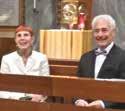
Ann Wintle (Linacre, 1969) and Charles Bonney (Pembroke, 1965) were married in St Andrew’s Church, Wimpole, Cambridgeshire on 20 January 2018. A champagne reception was held in the Hardwicke Arms, Arrington. After a brief honeymoon, they will be living in a thatched cottage in Arrington with their Shetland Sheepdog, Jack.

Dr Ken Au (2008) and Celine Leung were married in November 2017 in a beautiful ceremony at the Mandarin Oriental, Hong Kong. They came back to Oxford last September to have their pre-wedding photographs taken in college grounds.

Candice Motran (2008) and Micah Hampson were married on 13 May 2017, in a lovely medieval barn on the edge of Dartmoor in Devon. Lots of friends and family travelled from Canada, the USA, Australia and elsewhere to be there for their special day, for which they are eternally grateful.

Births
Guy de Tonquedec (1993) and his wife Claire are overjoyed to announce the birth of Louise on 17 January 2018. Siblings (LR) Astrid, Pierre, Florence, and Yves are pictured meeting Louise for the first time.


Dr Paul Pennington (2001) and Natalie (née Ondiak) Pennington (2005) welcomed their son Oliver John Douglas Pennington into the world on 18 December 2017, weighing just over 6 lbs. He’s healthy, doing great, and he and Natalie came home just in time for Christmas. Patrick (age 4) is proving to be a very good and caring big brother to Oliver.



Dr Rebecca Howe (née Clark) (2006) and Andrew Howe welcomed their second baby boy on 7 August 2017. Alexander Daniel Christopher Howe weighed 8lb 8oz.

Kemal Ercevik (2007) and Dr Laura Maubon are very happy to announce the birth of their first child, Louie, on 12 September 2017, weighing 7.5lbs/3.4kgs.


Dr Adam Thomas (2009) and Emily Hedin (2009) joyfully announce the birth of Delano Thomas Hedin on 17 September 2017.
Dr Xiao Wan (2010) and her husband Steven Ball (Brasenose) are delighted to announce the birth of their daughter, Valentina Xiaomeng Margaret Ball, on 2 April 2017. Valentina attended her first Linacre event in September, age 5 months!
Dr Amir Fruchtman (2012) and Dr Michal Dagan are delighted to announce the birth of their twin girls, Gali and Neta, born on 12 September 2017.
Friends and family of Dr Laura Droessler-Dansie (2009) and Dr Andrew Dansie (2012) descended upon the major metropolis of Port Lincoln, South Australia to celebrate their marriage on 31 December 2017. This would be the town’s second biggest event of the year with the annual celebration of Tunarama following a few weeks later. All those who celebrated in person and from afar made this such a special day for the bride and groom. Those from Oxford and Linacre (in bold) able to make the journey were: Zoe Reich, Amr Aswad, Maciek Reich, Franziska Mager, Dansie, Jeannine Hollaus, Chris Hinchcliffe, Philly Howarth, Alessandra Gage, Laura Droessler-Dansie, Urs Schüffelgen, Natasha Hjerrild, Matt Shepherd, Felix Dansie, Nick Rowland, Natasja Shermis

Xin Guo (2013) and her husband, Roger Fisher, are thrilled to announce the birth of their daughter, Freya, on 3 September 2018. She is pictured with her proud big brother Benjamin, age 6. Since Freya’s arrival, Xin has completed and submitted her thesis, and awaits her viva in March.
Meghan Treleaven Shaw (2004) and Tom Shaw (2003) threw a Burns Night Ceildh in January to celebrate the completion of Tom’s veterinary neurology residency and Meg turning 20 again. Around twenty Linacre Old Members travelled to Somerset to help celebrate. In the post-party breakfast photo, Meghan is holding Harriet Rose, known to most as ‘Peanut’, who arrived 5 July 2017.

15
Sporting Linacre

Football update
next race being on Friday against St. Hilda’s. Due to conflict with class schedules we had to put out a friendly boat with the missing novices being replaced with senior rowers. This added extra power to the boat and with the confidence from their Wednesday win they hit 36 strokes a minute, flying down the course and leading St. Hilda’s by a length at the start of Boathouse Island. Maintaining a powerful rhythm they extended their lead to win easily. The skill and enthusiasm of our Novices bodes well for the future as they join the seniors.
For the third year running, Linacre fielded two teams in the University men’s MCR Football league – one in the first division, and one in the third. We also have a women’s team, joint with Corpus Christi and Pembroke, playing in the Women’s first division. Three teams is not only a sign of the popularity of football in College, but also demonstrate two of Linacre’s core values: ambition and inclusiveness. It allows us to chase silverware and trophies, but also makes sure that everyone who wants to participate can get their boots out and play. So far, the first team has won all six matches in a convincing manner; they are strong contenders for this year’s league title and have already reached the semi-final in the cuppers competition, beating Kellogg, Univ and Balliol on the way. The second team is still unbeaten in their league (two wins and one draw) but had to bow out to a strong St. Catz side in the cup. LCFC participates in a campaign to promote equality and fight discrimination in sport and thus contributes to making football everyone’s game! (See http://www.stonewall. org.uk/our-work/campaigns/rainbow-laces).
Urs Schüffelgen, Football Club Captain
Sherona Forrester (2017) is playing for the OUWAFC Blues Football team. On 17 November 2017 she played a significant role in Oxford University beating Oxford Brookes 3-2 in a nail-biting match. OUWAFC came from behind twice to beat Brookes, who are a dominant side in University women’s football.
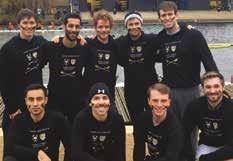

Christ Church Regatta

Having only rowed for seven weeks, our Novice women competed at Christ Church Regatta. Wednesday’s terrible weather caused trouble for many, but our novice crew kept calm and, with crew fist bumps for luck, they set off to challenge Wolfson. Linacre had a strong start, settling into a clean rhythm for the first half of the race. Then, as they passed the end of Boathouse Island, they put in a finishing burst to fight off a late challenge from Wolfson to win their first competitive race. Delays on Wednesday led to the
After a term of hard work and many early mornings (see cover), the Linacre Men’s novices can look back on an exhilarating and encouraging Christ Church Regatta campaign. On Wednesday afternoon, a strong and relaxed start saw us easily beat a Pembroke boat by four or five lengths, leaving them trailing despondently in our wake. Thursday saw the crew triumph in the face of much greater adversity as an unfortunate crash in the previous division left is ‘warming up’ beyond the gut in the rain for over an hour. By the time we made it to the starting line, bow pair were soaked to the skin and shivering uncontrollably! Meanwhile, our opponents from St Hilda’s had been hiding out in the comfort of their own boathouse. An impressive start saw St Hilda’s pull away to half a length of clear water as we reached Boathouse Island; however Linacre settled into a steady rhythm and remained within touching distance. As the race came into its last 250m, and St Hilda’s began to tire, Linacre called for push after push. The gap closed and the eyes of the St Hilda’s crew filled with fear as a black and yellow menace steamed towards them. With 25m to go Linacre pulled level, their momentum and confidence guaranteeing that there could only be one winner. Unfortunately, a lack of crew availability meant that we had to put out a friendly crew in the third round on Friday. A creditable performance saw the improvised crew, including two heroic subs who had just raced in the women’s novice boat, finish a length behind Wolfson, who went on to be crowned champions. Buoyed by the achievements and promise of this year’s intake, the men’s squad is looking forward to a successful Torpids campaign.
16
Printed by: Lavenham Press. Designed by: Neil Morgan Design
Heather Dun (Linacre), LBC Women’s Captain
Julian Ashwin (Nuffield), LBC Men’s Captain
Dr Charlotte Cookson (1999) and her running partner, Hannah Ball, are pictured after successfully completing the 2017 Oxford Half Marathon on October 8.
Linacre Ladies that Lift news – see page 13.






















































